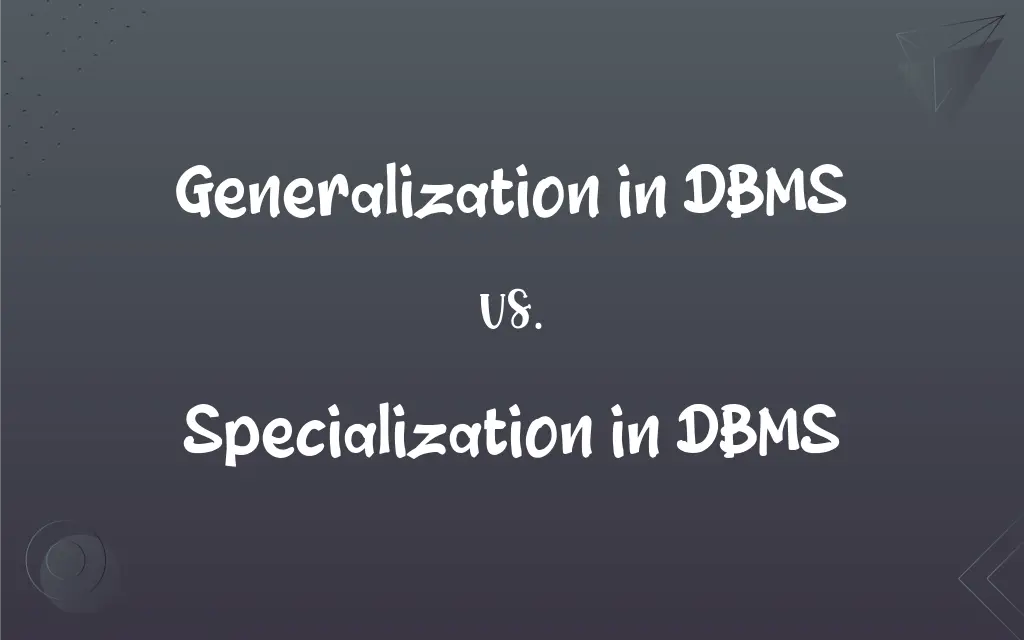Generalization in DBMS vs. Specialization in DBMS: What's the Difference?
Edited by Aimie Carlson || By Harlon Moss || Published on April 9, 2024
Generalization in DBMS is the process of combining similar entities into a single, more general entity, while Specialization is the process of dividing a general entity into more specific, detailed entities.

Key Differences
Generalization in DBMS involves identifying common features among different entities and combining them into a single, broader entity. This process emphasizes the similarities. In contrast, Specialization focuses on identifying unique features of a general entity and dividing it into more detailed subgroups, emphasizing differences.
Generalization is a bottom-up approach where specific entities are abstracted into a general one. This approach simplifies the database design by reducing redundancy. Specialization, a top-down approach, involves creating new entities from an existing, more general one, adding specificity and detail to the database.
In Generalization, the attributes of the generalized entity are common to all its specialized entities. It's about finding a common ground. Specialization, however, allows for the addition of unique attributes to the specialized entities, providing more detailed and specific information.
An example of Generalization would be creating a general 'Vehicle' entity from specific entities like 'Car', 'Bike', and 'Truck'. For Specialization, it would be dividing a 'Vehicle' entity into specific types, each with additional, unique attributes.
Generalization often leads to a more simplified and less detailed view, useful for high-level understanding. In contrast, Specialization results in a more complex and detailed database structure, suitable for detailed analyses and specific queries.
ADVERTISEMENT
Comparison Chart
Approach
Bottom-up (combining entities)
Top-down (dividing an entity)
Focus
Emphasizes similarities among entities
Highlights unique features of entities
Attribute Handling
Common attributes for generalized entity
Unique attributes for each specialized entity
Example
Combining 'Car', 'Bike' into 'Vehicle'
Dividing 'Vehicle' into 'Car', 'Bike'
Result
Simplified, broader entity
Detailed, specific sub-entities
ADVERTISEMENT
Generalization in DBMS and Specialization in DBMS Definitions
Generalization in DBMS
A bottom-up approach in database design.
Through generalization, 'Sedan' and 'SUV' became subtypes of 'Car'.
Specialization in DBMS
Dividing a general entity into specific ones.
Specialization in DBMS split 'Employee' into 'Manager' and 'Worker'.
Generalization in DBMS
Emphasizes commonalities among entities.
Generalization merged 'Checking Account' and 'Savings Account' into 'Bank Account'.
Specialization in DBMS
A top-down approach in database design.
Specialization created 'Electric Car' and 'Diesel Car' from the general 'Car' category.
Generalization in DBMS
Creates broader, less detailed entities.
Generalization formed a 'Mobile Device' category from 'Smartphone' and 'Tablet'.
Specialization in DBMS
Increases complexity for detailed analysis.
DBMS specialization introduced 'Indoor Game' and 'Outdoor Game' from 'Game'.
Generalization in DBMS
Simplifies complex database structures.
Generalization in our DBMS reduced redundancy by creating 'Electronic Device'.
Specialization in DBMS
Adds unique attributes to sub-entities.
Through specialization, 'Bird' was divided into 'Flightless Bird' and 'Flying Bird'.
Generalization in DBMS
Combining similar entities into a general one.
Generalization in DBMS created a 'Person' entity from 'Student' and 'Teacher'.
Specialization in DBMS
Creates more detailed, specific entities.
Specialization in DBMS led to 'Undergraduate Student' and 'Graduate Student' from 'Student'.
FAQs
What is Generalization in DBMS?
It's the process of combining similar entities into a more general one.
What does Specialization in DBMS mean?
It involves dividing a general entity into more specific, detailed ones.
Can Generalization and Specialization coexist in a DBMS?
Yes, they are often used together in a complementary manner.
Why use Generalization in database design?
To simplify the structure and reduce redundancy by focusing on commonalities.
Is Generalization a reversible process in DBMS?
Not directly; once generalized, splitting back into original entities requires additional operations.
Can Specialization lead to data redundancy?
If not managed carefully, it can create redundant data across specialized entities.
When is Specialization in DBMS beneficial?
When detailed, specific information is needed for different sub-entities.
What is an example of Generalization in DBMS?
Creating a 'Transport' entity from 'Car', 'Bike', and 'Bus'.
How does Specialization enhance data analysis?
By providing more detailed and specific data categories.
How does Generalization affect database queries?
It simplifies queries by reducing the number of entities.
Can Generalization and Specialization be automated in DBMS design?
Some aspects can be, but it often requires expert judgment to define appropriate categories.
Give an example of Specialization in DBMS?
Dividing 'Animal' into 'Mammal', 'Bird', and 'Fish'.
Does Generalization improve data integrity?
Yes, by reducing duplication and inconsistencies.
Does Specialization require additional storage space?
Potentially, due to the creation of more detailed entities.
How does Specialization affect the maintenance of a DBMS?
It can increase complexity and maintenance efforts due to more entities.
What impact does Specialization have on data retrieval?
It allows for more specific and detailed queries.
Is Generalization more suited for large databases?
Yes, especially when managing a broad range of similar data types.
Can Specialization be applied to any entity in a DBMS?
Theoretically, yes, if there are meaningful subcategories to be defined.
What are the risks of over-generalizing in a DBMS?
It may lead to loss of important specific details and attributes.
How does Generalization handle relationships between entities?
It consolidates relationships into a more general form.
About Author
Written by
Harlon MossHarlon is a seasoned quality moderator and accomplished content writer for Difference Wiki. An alumnus of the prestigious University of California, he earned his degree in Computer Science. Leveraging his academic background, Harlon brings a meticulous and informed perspective to his work, ensuring content accuracy and excellence.
Edited by
Aimie CarlsonAimie Carlson, holding a master's degree in English literature, is a fervent English language enthusiast. She lends her writing talents to Difference Wiki, a prominent website that specializes in comparisons, offering readers insightful analyses that both captivate and inform.































































